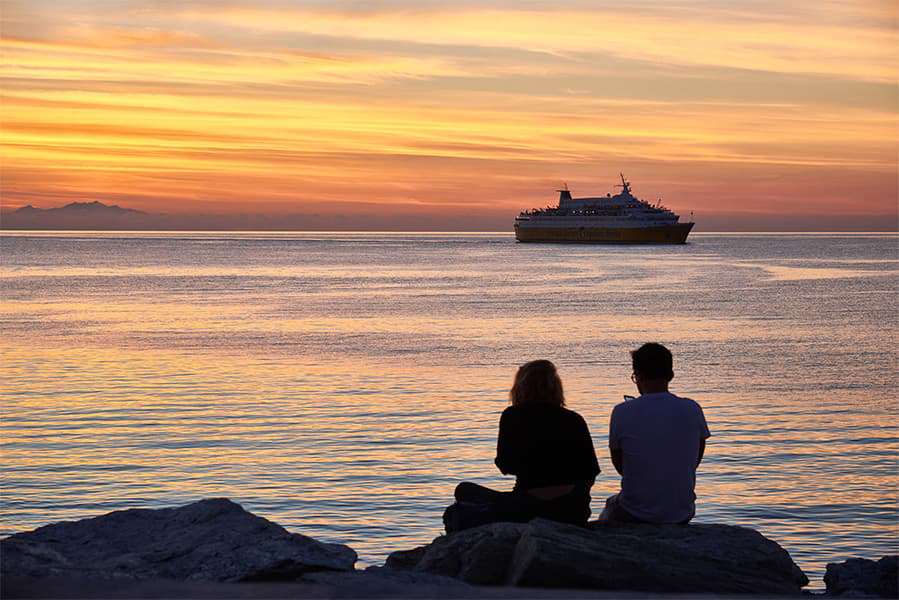Palma - Ibiza
Ferries to Ibiza
Palma - Ibiza
Ferries to Ibiza

The Palma to Ibiza ferry route is provided by 2 ferry companies. The ferry crossing from Palma to Ibiza is approximately 2 hours 15 minutes on most ferries servicing this route. Ferries between Palma to Ibiza cost around $112 and $793, depending on ticket details. Prices exclude any service fees. Ferry timetables change seasonally, use our Deal Finder to get live pricing and availability for ferries from Palma to Ibiza.
Palma Ibiza ferry sailings typycally depart from Palma at around 08:00. The last ferry leaves at 10:01.
The Palma Ibiza ferry trip can take around 2 hours 15 minutes. The fastest Palma to Ibiza ferry is around 2 hours 15 minutes. Crossing times can vary between ferry operator and seasons.
There are around 9 weekly sailings from Palma to Ibiza serviced by Balearia & Trasmed GLE. Timetables can vary by season and operator.
Palma Ibiza ferry prices typically range between $112* and $793*. The average price is typically $340*. The cheapest ferries from Palma to Ibiza start from $112*. The average price for a foot passenger is $325*. The average price for a car is $397*.
Ferry price can vary based on booking factors such as number of passengers, vehicle type sailing times. Pricing is taken from searches over last 30 days and exclusive of service fees, last updated February 26.
The distance between Palma to Ibiza is approximately 93 miles (150km) or 81 nautical miles.
Yes, Balearia & Trasmed GLE allow cars on board ferries between Palma and Ibiza. Use our Deal Finder to get live pricing for car ferries between Palma and Ibiza.
Foot passengers can travel on the Palma to Ibiza ferry with Balearia & Trasmed GLE.
Pets can travel on ferries from Palma to Ibiza with Balearia. Pets may have to stay in the vehicle during the journey depending on the operators guidelines.
More routes than anyone else.

Compare fares, times & routes in one place.
Change plans easily with flexi tickets.

Book e-tickets & manage trips in-app.
Live ship tracking & real-time updates.

Top-rated customer support when you need it.
| Palma - Ibiza Ferry Route Summary | ||
|---|---|---|
| Departure Country | Mallorca | |
| Destination Country | Ibiza | |
| No. of Operators | 2 | |
| Operators | Balearia & Trasmed GLE | |
| Average Price | $340 | |
| Average Daily Sailings | 1 | |
| Average Weekly Sailings | 9 | |
| Average Sailing Duration | 2 h 15 m | |
| Fastest Sailing Duration | 2 h 15 m | |
| First Ferry | 08:00 | |
| Last Ferry | 10:01 | |
| Distance | 81 Nautical Miles | |
* Prices subject to change, pricing is taken from last 30 days, last updated 1 February 2026.
The city of Palma is located on the south coast of the Spanish island of Majorca and is the capital city of the Balearic Islands. The city lies on the Bay of Palma and is surrounded to the north and west by a mountain range, which has been declared a UNESCO World Heritage Site, called the Serra de Tramuntana. The city's history dates back to Roman times when the site of the present day city was an established Roman camp. Over the course of its history, the city has also come under the rule of the Byzantine Empire, the Moors and James I of Aragon.
The city is now very popular with tourists with attractions like La Seu, the city's cathedral. Built on the site of an earlier mosque, construction on the cathedral began in 1229 and was finally completed in 1601. Also in the city is the Parc de la Mer (the Park of the Sea) which is overlooked by the cathedral and is where visitors can relax under a large yellow and blue canopy which provides shade to a row of wooden benches.
Palma Ferry Port is located on the south western side of the city and provides excellent views of the cathedral as ferries depart. The busy port has good connections to major roads leading out of the city. Destinations available from the port include Ibiza, Mahon, Barcelona, Valencia and Denia.
The Spanish island of Ibiza lies in the Mediterranean Sea and is located to the east of the Iberian Peninsular and is one of the Balearic Islands. The island's land area is just over 570 sq. km and along with the neighbouring island of Formentera was called the island of the pines by the Greeks. Ibiza Town, the largest town on the island, was first settled by the Phoenicians and still has walls surrounding it that were built in the 16th century to prevent attack by Turkish pirates.
Today, the town is characterized by narrow cobbled streets, medieval mansions and a cathedral which is located close to the castle. the island is popular with scuba divers who are attracted to the island's warm, clear waters. The sea bed in the Las Salinas National Park is a UNESCO World Heritage Site, because of the ecological importance of the sea grass that grows there.